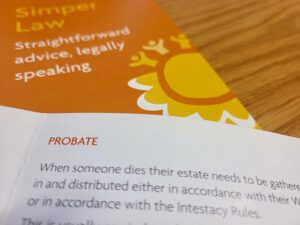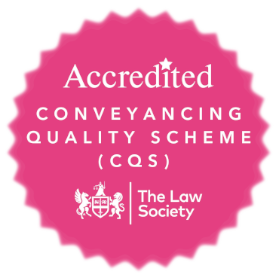How To Apply For Probate
 The loss of a loved one is an emotional, stressful experience. We understand that the stress is often exacerbated by the burden of the administration that needs to be undertaken following a death, which can seem complicated and overwhelming. For many, it will be the first time they have been tasked with such a responsibility, and they will have no prior knowledge of probate procedures. Here, we seek to simplify the probate process by describing how it works and explaining how to apply for probate.
The loss of a loved one is an emotional, stressful experience. We understand that the stress is often exacerbated by the burden of the administration that needs to be undertaken following a death, which can seem complicated and overwhelming. For many, it will be the first time they have been tasked with such a responsibility, and they will have no prior knowledge of probate procedures. Here, we seek to simplify the probate process by describing how it works and explaining how to apply for probate.
Please call us now on 01603 672222 for a no-obligation conversation today or Click Here To Make An Online Enquiry.
“My sister and I would like to thank Kim for her help with dealing with probate for our late mum. Kim was professional, sympathetic and also provided great advice to.”
K C of Norwich.
What Is Probate?
The term ‘probate’ is often used interchangeably to refer to the document that provides the legal entitlement to deal with an estate and the process through which the estate is administered. That process ordinarily involves satisfying any debts and distributing any assets – money and other property – in accordance with the terms of the Will or the Intestacy Rules.
If there is a Will in place, the deceased will usually have nominated individuals to be executors of their estate. If your loved one did not leave a Will, they will be classed as having died ‘intestate’. In these situations, the law steps in and dictates who can act as executor and how the estate should be distributed. Usually, the deceased’s spouse or civil partner will be called upon to administer the estate, with other family members ranking behind them in a specified order. Those chosen through this means are not executors, but ‘administrators’. An administrator’s role is essentially the same as that of an executor but they derive their powers from a document known as the Letters of Administration issued by the Court, rather than the Will.

Do I Need A Grant Of Probate?
Since an executor’s powers derive from the Will, clients are often unsure whether they require a formal Grant of Probate to administer the estate. There are some circumstances in which a Grant of Probate may be unnecessary. These include if the deceased held all of their assets jointly or if the sums in an individual bank account are below the threshold specified by the relevant financial institution. However, you cannot deal with estate property without first obtaining a Grant of Probate and the Court will not make any Order applied for in the absence of a Grant. Speak to us if you are unsure; we will review the estate and advise accordingly.
How To Apply For A Grant Of Probate
Whilst the process of applying for a Grant of Probate itself is fairly straightforward, the preparatory work and supporting documentation required can be complex and cumbersome. Our expert probate solicitors can relieve the burden by undertaking the work for you should you so desire and will do so with compassion and sensitivity.
The probate process can be broken down into the following steps:
1. Collate Full Details Of The Estate’s Assets And Liabilities.
Before you can apply for a Grant of Probate, you must ascertain the value of the estate. You need to include an estimated value when applying for the Grant. This process involves establishing the value of the deceased’s assets and the extent of any debts and liabilities.
The value of assets such as cash held in banks and building society accounts can be established by writing to the financial institutions. Details of other assets such as pension pots and shareholdings need to be obtained, and any property must be properly valued.
2. Organise Inheritance Tax.
Inheritance tax is payable on estates valued over the inheritance tax threshold, which currently stands at £325,000. You will usually have to pay any inheritance due before you can distribute the estate to the beneficiaries and will normally have to pay at least some of it before the Grant of Probate is issued.
3. Apply For The Grant Of Probate.
It is usually possible to apply for a Grant of Probate online. Whilst this is a relatively straightforward exercise, any inaccuracies in the information provided will cause delays. It is, therefore, advisable to seek help from an experienced probate solicitor to ensure the form is properly completed.
Most Grants of Probate will be issued within 16 weeks of receipt by the Probate Registry. However, the process can be severely delayed if an application is inaccurate or incomplete or for other reasons such as Inheritance Tax issues or unexplained changes in the Will’s physical condition.
4. Pay Debts
Once the Grant of Probate has been received, you can start dealing with the estate. The first step is to clear the estate’s outstanding debts and liabilities.
5. Distribute The Estate
When all debts and liabilities have been cleared, the remainder of the estate can be distributed to beneficiaries in accordance with the terms of the Will. This is usually straightforward but can be complicated if issues arise such as being unable to locate a beneficiary, or someone challenging the Will.
“I have already recommended you to our Son. We are extremely pleased with the professional service we received.””
Mr & Mrs Perrett.
How To Apply For Probate With The Help Of A Solicitor
It is not obligatory to use a solicitor when applying for a Grant of Probate. However, the process can be difficult to navigate and overwhelming, and sometimes requires an understanding of complicated legal and taxation rules. This is particularly the case with high value estates, or where the provisions of a Will are disputed. Our probate solicitors are experts in the field, having amassed years of experience helping executors to obtain Grants of Probate and administer estates effectively. They deliver concise, straightforward advice and ensure that every matter is dealt with in the most cost-effective way possible.
Please call us now on 01603 672222 for a no-obligation conversation today or Click Here To Make An Online Enquiry.

